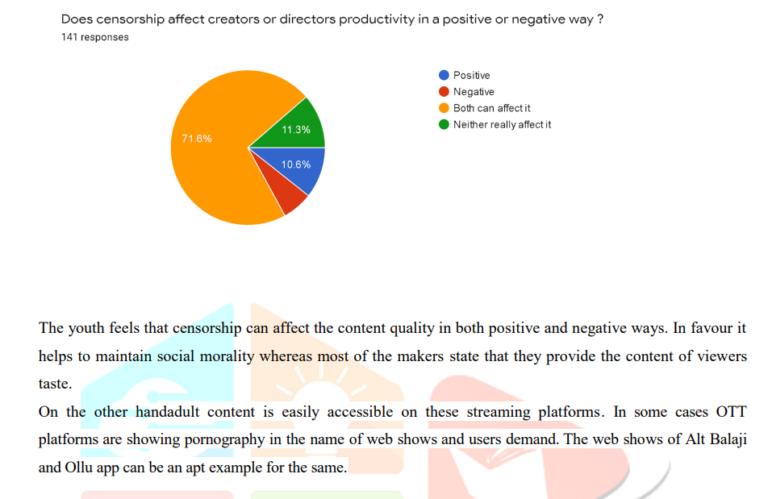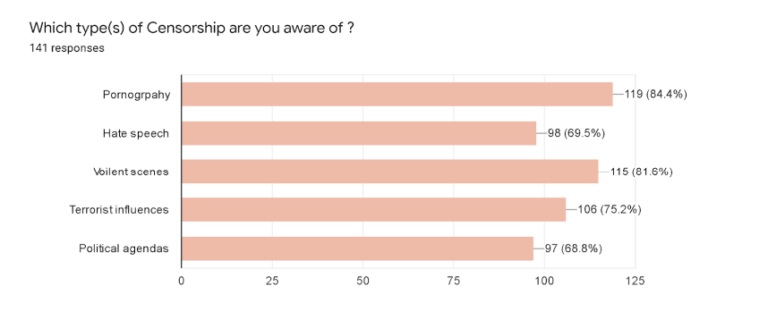The Rise of Over-the-Top Platforms: A Blessing or a Curse?
Before we begin to discuss the topic, I think it is important for us to understand what censorship means and what is its purpose. Google defines censorship as the “suppression of speech, public communication or other information on the basis that the material is considered objectionable, harmful, sensitive or inconvenient.” People who do not want any censorship fall into two broad camps.

First, there are people who believe that there should not be any suppression of speech or information. Second, there are people who believe that many definitions of what is considered objectionable or sensitive is very subjective and hence there should not be any censorship.
I believe that any freedom, including freedom of speech is not an absolute right. I also believe that while there is subjectivity in what is considered censorship, broadly as a society we have benefitted from having censorship.
Censorship can help protect users from hate speech, offensive content, and other inappropriate material. Additionally, censorship can help protect users from cyber-attacks and other security threats. Finally, censorship can help maintain a safe and secure environment for users, which can lead to increased user satisfaction and engagement. Hence I believe that having censorship in OTT platforms is,in fact, a boon.
For a moment, close your eyes and imagine a situation where there was no censorship in OTT. What a chaotic situation you would find in this situation! All sorts of illegal content could be streamed in the name of entertainment-suicides, murders, porn, illegal drugs. Who would draw a line? This is where censorship comes into play and helps to moderate content accordingly in the OTT platform and thereby help society.
People mix moderation with censorship in the case of OTT. OTT by nature is a global platform allowing streaming of global content to our homes and drawing rooms. For example, a TV series can be shot in the US and streamed across the globe to multiple countries on a platform like Netflix. Such global content, therefore, could be acceptable in certain cultures and not so in some other cultures. For example, showing adult content is permissible in certain cultures with proper certification, but could be problematic in certain other conservative cultures. This is a reality and cannot be shrugged off so easily.
Censorship on OTT platforms poses a unique set of challenges. OTT platforms are difficult to monitor and control, as they are not subject to the same regulations as traditional media outlets. This means that censorship is not always effective on these platforms. Additionally, censorship on OTT platforms can be difficult to enforce. OTT platforms are often global in nature, and different countries may have different censorship laws. This can make it difficult to ensure that content is censored in all countries. Additionally, censorship on OTT platforms can be difficult to detect, as users may be able to access censored content by using a VPN or proxy server.
Secondly, censorship acts as a gatekeeper providing disincentive for people to show certain content. If there is no censorship, there is no disincentive and then it is left to the content creator’s “good” faith and judgment to define what content is good for their audience. So the same people who believe censorship is subjective are now exposed to the subjective whims of these creators! Also, who is to trust the “good” faith of these creators?
Although I wholeheartedly think having censorship on over-the-top platforms is a boon, it might have some downfalls. Censorship on OTT platforms can have a significant impact on the user experience. Restrictions on access to certain content can limit the range of content available to users. Additionally, censorship can limit freedom of expression and lead to self-censorship. This can have a detrimental effect on creativity and innovation. Furthermore, censorship can lead to reduced engagement and a decrease in user satisfaction.

Freedom of speech and expression is not recognized as an absolute right under the Indian Constitution. The freedom of speech and expression is guaranteed by Article 19 (1) (a) of the Indian Constitution, and it is reasonably restricted by Article 19 (2). It states, “Nothing in sub-clause (a) of clause ( 1 ) shall affect the operation of any existing law, or prevent the State from making any law, in so far as such law imposes reasonable restrictions on the exercise of the right conferred by the said sub-clause in the interests of the sovereignty and integrity of India, the security of the State, friendly relations with foreign States, public order, decency or morality or in relation to contempt of court, defamation or incitement to an offense” This was the first feature that helped introduce censorship laws into our system. Since the information streaming on these OTT platforms is unregulated, it could be against Article 19 of the Indian Constitution. As a result, OTT platforms cannot permit the broadcast of unrestrained, unedited, and uncontrolled content under the right to free speech and expression. Also, it must adhere to several regulations, such as not harming others’ reputations, upholding public order and health, violating morals, etc. Reasonable restrictions are set in accordance with the defined boundary of the decency standards of society. Thus, it becomes challenging to show movies, like “Udta Punjab,” “Haider,” and “My Name Is Khan,”, etc as such movies highlight societal issues that might have an impact on public order and sovereignty. Thus, the creation of the Censor Board serves as a benefit with regard to these problems.The government of India should not bring censorship of over the top platforms under its ambit. Over the top platforms like Netflix, Amazon Prime, and Hotstar provide a wide variety of content, including news, movies, and original shows. Content censorship could limit the freedom of expression of creators, as well as potentially limit access to diverse ideas and information. Moreover, the government should focus its efforts on ensuring that the platforms adhere to the existing laws and regulations in India, such as the Information Technology Act, the Cinematograph Act, and the Copyright Act.
As per a survey by YouGov, 57% of people (1005, approximately.), support partial censorship for online streaming. They think that a lot of offensive content i.e., unsuitable for public viewing is put up on such platforms. Majority of the people supporting censorship are adults of the age above 40s. However, the strongest arguments against such censorship is that the content on OTT platforms are Subscription on Demand, where viewers have choice to pay and select what to watch.Apart from this, the piracy of movies is another factor why filmmakers take the route of OTT. There are a large number of artists who don’t have enough money to portray their creative thoughts through cinema, OTT comes as a great breakthrough for them.
As per a survey of 141 respondents, When asked; what type of censorships are you aware of? These were the results.

There are a number of strategies that can be used to address censorship on OTT platforms. Platforms should ensure that they are compliant with relevant laws and regulations. Additionally, they should strive to provide users with access to a wide range of content. Platforms should also ensure that they are transparent about their censorship policies and work to ensure that users are aware of any restrictions that are in place.
We have had censorship in India for a very long time. From the times of the maharajahs to the British to independent India, governments (and kings) have imposed censorship in some form or fashion, often to safeguard public good. Since then, other countries have implemented their own censorship laws, with varying levels of success. In recent years, censorship of OTT platforms has become more widespread and sophisticated. Many countries now have the ability to block access to certain websites, or to monitor and control what content is available on OTT platforms. Especially since in OTT, the family is directly involved in watching the content in the comfort of their house. We have a censor board for movies where the board decides which movies are appropriate for which audiences. This system of censorship has by and large worked for us. Censorship is not an easy problem to solve, but with the right strategies and tools, it can be managed effectively. By understanding the challenges of censorship on OTT platforms and implementing the right strategies, platforms can ensure that their users have access to a wide range of content while also ensuring that their users are protected from inappropriate or offensive material.
In conclusion, I am reminded of the quote by Uncle Ben to Peter Parker in the Spiderman movies. “With great power comes great responsibility”. There is no denying that OTTs today have great power. They are present in ever growing numbers in every household today. People, young and old, from the 4 year old to the 80 year old grandparents consume content on OTT today. But do OTTs have great responsibility? That only comes from censorship in my view.
By Manya Agrawal
Also Read:
PLAYING THE MARKET: STOCKS OR SLOTS-Deciphering the fine line
Playing the market: Stocks or Slots?Deciphering the Fine line The world of finance, the stock …
Social Echoes: Amplifying Sales through Digital Word-of-Mouth
Social Echoes: Amplifying Sales through Digital Word-of-Mouth It is a truth universally acknowledged that E-Commerce …
Unlocking the Potential: A Comprehensive Analysis of the IMEEEC
Unlocking the Potential: A Comprehensive Analysis of the India-Middle East-Europe Economic Corridor (IMEEEC) Abstract The …
